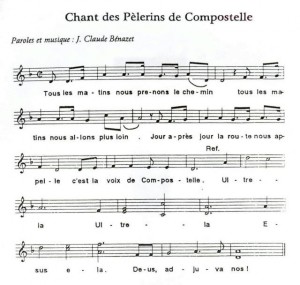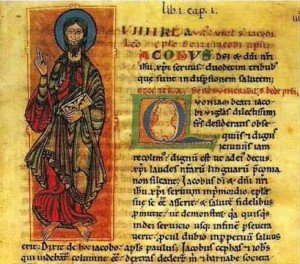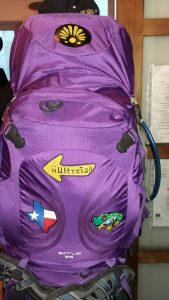The name Ultreïa is a mix from latin and an old french language. It used to be shouted between former pilgims of the Midle Age as a wish of an unfailing courage.
The true words seem to be ““E ultreïa, E susseïa” as : “Go upper, go farther!
We can find those words in the hymn “Dum pater familias” of the Liber Sancti Jacobi. This “Book of Saint James” is part of the Codex Calixtinus written in 1140 and preserved in the cathedral museum of Santiago (after having been stolen a few years ago in 2011).
You can listen to this hymn sung by the vocal ensemble : “Organum” through this internet link;
Hereafter the text translated by the spanish historian ans musicologist Eusebio Goicoechea Arrondo
Herru Sanctiagu Lord Saint James
Got Sanctiagu Great Saint Jacques
E ultreïa Lets go farther,!
E suseïa Lets go higher!
Deus adjuvat nos. God, please help us!
Is there anything nicer we could wish to our pilgrims when they leave our hostel every morning in nthe assault of the Pyrennes!
ULTREÏA !
Ultreïa is also the theme of a lot of songs about the Camino. Hereafter you will find one of the the most wellknown : “Tous les matins” written and sung here by Jean-Claude Bénazet.

Tous les matins nous allons plus loin.
Jour après jour, St Jacques nous appelle,
C’est la voix de Compostelle.
Ultreïa ! Ultreïa ! E suseia Deus adjuva nos !Chemin de terre et chemin de Foi,
Voie millénaire de l’Europe,
La voie lactée de Charlemagne,
C’est le chemin de tous les jacquets.
Ultreïa ! Ultreïa ! E suseia Deus adjuva nos !Et tout là-bas au bout du continent,
Messire Jacques nous attend,
Depuis toujours son sourire fixe,
Le soleil qui meurt au Finistère.
Ultreïa ! Ultreïa ! E suseia Deus adjuva nos !Quand l’amitié estompe le doute
Dans un élan de fraternité
On peut alors reprendre la route
Et s’élever en toute liberté.
Ultreïa ! Ultreïa ! E suseia Deus adjuva nos !

